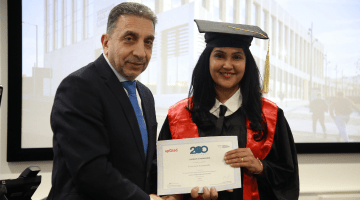Course modules
Discover the building blocks of your programme
Further guidance on modules
Modules are designated core or optional in accordance with professional body requirements, as applicable, and LJMU’s Academic Framework Regulations. Whilst you are required to study core modules, optional modules provide you with an element of choice. Their availability may vary and will be subject to meeting minimum student numbers.
Where changes to modules are necessary these will be communicated as appropriate.
Core modules
Academic Skills
15 credits
15 credits
This module introduces the principal theories and methodologies underpinning the processes of practice as research, self-reflection, and reflective analysis. You analyse your own professional work and discover how to use that work as research to develop your professional journey. You are invited to self-reflect in a critically rigorous manner and apply the conclusions to career planning and development. Through lectures, seminars, and group discussions, you develop your essential learning, academic and writing skills, while cultivating essential critical thinking skills. You become familiar with appropriate research methodologies and understand the importance and procedures of ethical conduct of research projects in preparation for designing your own research projects and MA dissertation.
Research Project
15 credits
15 credits
Through this module, you develop your academic writing and research skills. These are essential to enable you to evaluate and critically analyse complex elements of a research project, through either a practice-based research dissertation or a research-based dissertation. Through lectures, seminars and one-to-one tutorials, you learn how to propose and defend a research project and to critically evaluate complex and current debates concerning working methods within the music industry. You gain insights into how to devise a sophisticated research methodology, gather and critically analyse data and evidence so you can present informed, sophisticated and objective arguments regarding the various dynamics underpinning, informing and frame-working your chosen sector of the Music Industry. In addition, you will be able to use academic theories and industry-based methods to analyse and evaluate approaches to achieving high quality, innovative, productive and creative applied work within your chosen sector of the music industry.
The Music Industry
30 credits
30 credits
This module gives a wide-ranging critical overview of the music industry, studying music business organisation, the industrys evolving infrastructure and how entrepreneurs grow new music business models. Students take a deep dive into record labels, publishing, artist management companies, live music, and events companies. The module examines the importance of intellectual property, copyright management, music agreements, income streams and music catalogue exploitation including the role played by new digital technologies.
Music Management
30 credits
30 credits
In this module, students examine the history and development of management techniques as well as the latest and emergent approaches in the context of a changing and dynamic industry. Combined with a deeper study of strategies for effective management, students evaluate the latest industry practices and ideas, while developing research skills through independent research into their chosen area of the music business. They develop a comprehensive understanding of artist management, the skills and traits required to manage bands and small medium music enterprise, while developing a knowledge of strategic marketing techniques and research music manager career profiles. As part of this module students produce a bi-weekly podcast "Music Business Insider", interviewing music managers working in various areas of the music industry, providing invaluable insights into their career journeys and practice.
Music Management Project
30 credits
30 credits
Term 1 Feasibility & Planning
The module allows students to, research and demonstrate the viability of their practical ideas, through detailed study of proposals, strategies, concepts, resources, and budgets. The study is designed to inform the students practical work in term 2, confirming a coherent methodology that is applicable to their proposals and area of research. Students develop critical thinking and problem-solving skills whilst establishing the scope of their project including key performance indicators designed to guide progression and practical work.
Term 2 Process and Execution
The project promotes real-world industry engagement and research through distinct practical project work that is career led, contributing to ongoing professional development and personal career planning. The work is informed by the findings of the feasibility study conducted in term one, putting into practice the skills and knowledge learned on the course, demonstrating familiarity with music industry management practices, operating as a manager collaborating with a team of professionals in a creative environment. The practical work is supported through experienced industry mentors and managers, relevant to the students chosen career pathway and/or subject specific research topic. The module prepares students for the Practical Project Based Dissertation, as well as, managing in the music industry.
Optional Modules
Dissertation
60 credits
60 credits
The course culminates in a major investigative research project which can either be a Dissertation or a Practical Project Dissertation. The Dissertation is designed to build on the lessons and insights of your professional activities experienced throughout the course. The module considers critical and innovative ideas, relevant theoretical perspectives to the music and wider creative industries and developments in global economies and public policy. At the same time, you critically explore how these and other similar considerations relate to the subject area. You undertake career analysis and thereby determine key questions that will inform your research themes and personal understanding of your work and career development.
Practical Project Dissertation
60 credits
60 credits
The course culminates in a major investigative research project which can either be a Dissertation or a Practical Project Dissertation. The Practical Project Dissertation provides you with an opportunity to make a distinctive contribution to the industry and enhance your professional profile. The module allows you to propose, devise and deliver a significant professionally focussed project which robustly addresses your career priorities, identified through careful self-reflection and critical analysis. Your project work is individually directed and managed, with supervisions and mentoring support. You consider critical ideas, music industry developments and how those concepts relate to your own career development and the wider music and creative industries. The Practical Project Dissertation allows you to refine your research skills, develop practice as research methodologies. At the same time, you develop a range of relevant transferable skills operating at a professional level. The project prepares you to function as a highly skilled manager ready to work professionally in the music industries.
Career paths
Further your career prospects
LJMU has an excellent employability record with 96% (HESA 2018) of our postgraduates in work or further study six months after graduation. Our applied learning techniques and strong industry connections ensure our students are fully prepared for the workplace on graduation and understand how to apply their knowledge in a real world context.
Tuition fees and funding
Entry requirements
You will need:
Qualification requirements
Alternative qualifications considered
Undergraduate Degree in a cognate area, normally at 2:1 or above or equivalent professional practice. This programme seeks to admit students who have an established level of professional practice either through employment or through recognised or appropriate training at undergraduate level. Entry will be by interview with portfolio as appropriate. The emphasis on interview and portfolio when appropriate allows for individual assessment. The course places emphasis on individual methodologies for critical analysis and design of research and as such supports a diverse range of applicants. All classes are conducted in English. The level of proficiency in English expected is IELTS 6.5.
How to apply
Securing your place at LJMU
Your university life
From accommodation and academic support to clubs and societies. Find out what LJMU has to offer.
Related Links
Talk to our students
Connect with a current LJMU student for advice and guidance on university life, courses and more.
See what our students are saying
At LJMU we want you to know you’re making the right choice by studying with us. You can see what our students are saying about their experience with us through their reviews on the following websites:
Related Links
News and views
Browse through the latest news and stories from the university










The University reserves the right to withdraw or make alterations to a course and facilities if necessary; this may be because such changes are deemed to be beneficial to students, are minor in nature and unlikely to impact negatively upon students or become necessary due to circumstances beyond the control of the University. Where this does happen, the University operates a policy of consultation, advice and support to all enrolled students affected by the proposed change to their course or module.















